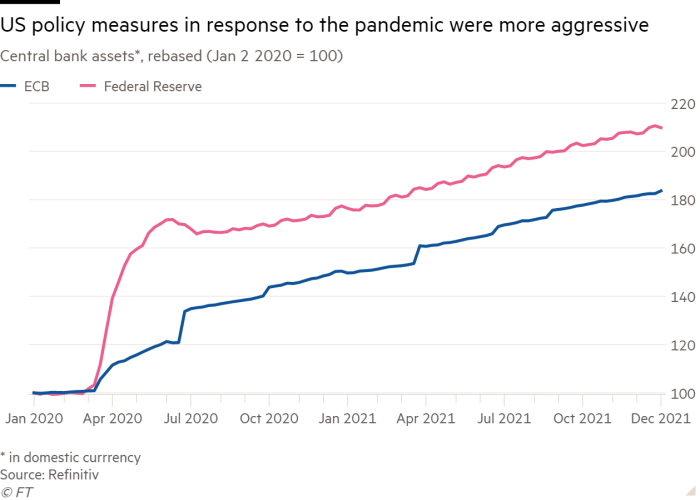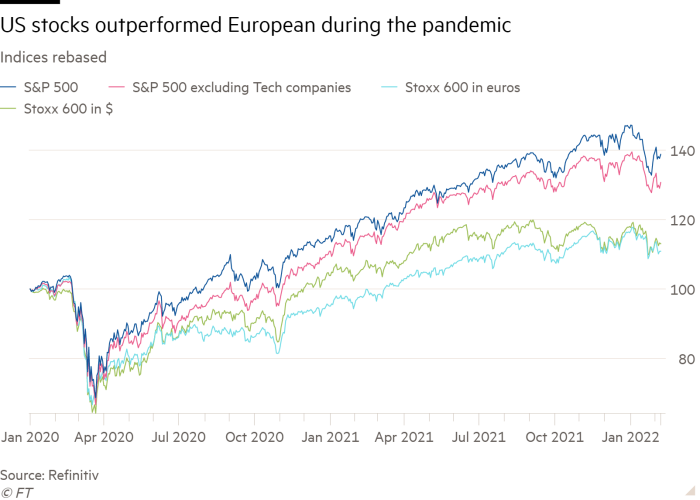European companies languish on a slow lane as the US dominates the corporate landscape
Europe’s fragmented single market is like an obstacle course, relegating the region’s businesses to second place in the global race for growth.
The failure to harmonize rules within the trading bloc has allowed US companies to take the lead on growth issues, say some of the continent’s leading industrialists. According to them, a patchwork of regulations stifles innovation and expansion.
“There are so many hurdles and barriers that make growth difficult,” said Carl-Henric Svanberg, chairman of the influential Brussels-based European Industry Roundtable, which brings together leaders from 60 of the biggest industrial and technological companies of the continent. .
He said the US economy grew much stronger than Europe’s in the decade 2008-2018. Cumulative real growth in the US was close to 19%, compared to 11.4% for the EU including the UK. “The price we are paying for not achieving this growth is huge,” added Svanberg, who is also chairman of Sweden’s AB Volvo and has run European giants such as Ericsson and BP.
Svanberg’s comments in an interview with the Financial Times come as Europe hands out a €750 billion post-Covid-19 recovery fund aimed at driving the EU’s digital and green transition. But business leaders fear that the failure to fully harmonize rules in areas such as digital services, capital markets and energy will hold back European businesses.
The region’s problems appear to have been exacerbated during the pandemic, when just 16 European companies, including four from the UK and Switzerland, broke into the global top 100 by market capitalization growth in the two years. before the end of 2021.
In contrast, the United States delivered 58. Over the same period, the S&P 500 rose 46%, compared to a rise of just 16% for the European Stoxx 600. The gap remains, even if in 2022 investors withdraw from technology stocks which has driven US valuations.
“We are very slow, very complicated,” said Martin Brudermüller, chief executive of European chemicals group BASF. “Low-carbon solutions and advanced digital technologies can be developed much faster by companies if they are not faced with national barriers, lengthy authorization procedures and fragmented policies in various Member States. “
European companies have long lagged behind their rivals in the United States, where businesses are able to grow faster thanks to a single market of 330 million people sharing the same language, harmonized regulations and markets of deeper capitals.
Analysis by capital markets think tank, New Financialfound that on average, capital markets in the EU27 are half as large relative to gross domestic product as in the UK, which in turn is about half as developed as the US.
But Andre Köttner, global co-head of equities at DWS in Germany, said Europe had taken a double hit from the pandemic. First, it lacks fast-growing global tech giants. Companies such as Apple, Amazon, Facebook and Google have been able to exploit the shift to online consumption that has accompanied the global lockdown.
Second, “Europe has dealt with the Covid pandemic more harshly than other countries, so businesses have been hit harder,” Köttner said. “In the United States, there were fewer restrictions.”
There was also a difference in the speed and scale of government support, according to Jorma Ollila, a former chairwoman of Royal Dutch Shell and Nokia, and now a board member of investment bank Perella Weinberg Partners. “Expansive fiscal and monetary policies had an impact in Europe, but the impact in the United States was greater,” he said. The American measures were “more aggressive than in Europe. And the United States started earlier.
The difference is highlighted by the significantly larger expansion of the US Federal Reserve’s balance sheet compared to the European Central Bank in the early months of the pandemic. In late March 2020, Donald Trump, then President of the United States, signed into law a bill providing $2.3 billion in emergency measures to help individuals, businesses and the wider economy, or about 11 % of GDP.
European support was also structured in a way that did not promote competitiveness, said Simon Freakley, chief executive of New York-based consultancy AlixPartners. “In the United States, federal programs directly supported the employee while in Europe they supported the employer, to protect jobs in Europe,” he said.

“There was no incentive for employers to downsize. American companies have therefore come out of the blocks more quickly than in Europe.
Data from Refinitiv confirms this view, with aggregate S&P 500 earnings surpassing early 2019 levels in the third quarter of 2020, while European Stoxx 600 companies took until the first quarter of last year to recover. to sort out.
But the experience of the pandemic does not mean that European companies are worse than their American rivals, insisted Drew Dickson, chief investment officer of London fund Albert Bridge Capital.
Nor does the lack of major global tech companies in Europe signal something rotten in the state of European affairs. Instead, it’s simply “the result of history and chance” – the migration decades ago of tech geeks to Silicon Valley. “It wasn’t Chicago, New York, Nashville or Austin,” he said.
“It’s not an American thing. You have four of the biggest companies in the world within 40 miles of each other. There was a regrouping that happened.
European companies are very competitive in other sectors, Dickson explained. “If there’s a Boeing, there’s an Airbus,” he said. “Where there’s a GM, there’s Volkswagen. A Southwest, a Ryanair. Once you get into other sectors, there’s no clear winner. This argument that there’s something better in the United States is wrong, except in the field of technology.
Daniel Grosvenor, director of equity strategy at Oxford Economics, agreed there is a danger in being too pessimistic about European companies. “They didn’t do badly overall. European profit margins are back at an all-time high. It’s not that they had a bad pandemic, it’s just that they underperformed their American counterparts.

Dickson argued that the underperformance was partly due to global investors’ obsession with high-growth tech stocks that dominate U.S. indexes. Europe, on the other hand, favors value stocks or companies whose earnings or book values suggest a higher price is deserved.
But Europe’s lack of global tech giants remains a weakness in an increasingly connected world, said James Watson, economics director at lobby group BusinessEurope. “The concern is that we are not in the areas where we expect profits in the future,” he said.
There are signs that this could change. Last year, Europe’s tech sector attracted $100 billion in investment, almost three times the level recorded in 2020. According to Atomico’s State of European Tech 2021 report, the sector added $1 billion worth in just eight months for a total of $3 billion last year. year, and returns from venture capital investments in Europe exceed those in the United States. But there is still a big gap.
So the question is whether the pace can be picked up as European governments prepare to spend around a third of the €750 billion recovery fund on digital transformation.
For Svanberg, this can only happen if the obstacles to the single market are removed. For example, “we don’t have a single market for 5G in Europe,” he said. “It makes it harder for digital businesses to scale. And we need to be digitally successful, otherwise we can’t achieve green transformation.”
Big companies aren’t the only ones worried about the possibilities for growth if Europe fails to create a full single market. “Many small and medium-sized businesses still do not see Europe as an internal market,” said Ben Butters, chief executive of Eurochambres, which represents more than 20 million businesses, most of which are SMEs.
“There are many barriers preventing businesses from capitalizing on the single market. When that happens, hopefully we’ll have a lot more names on that list of leaders.


Comments are closed.